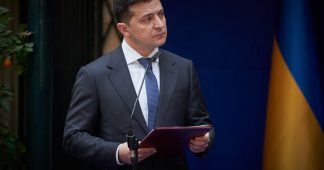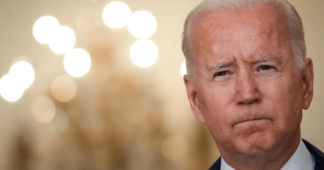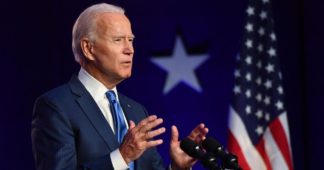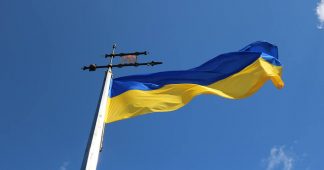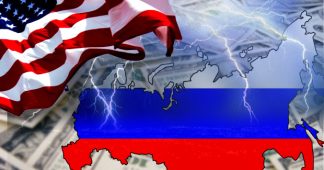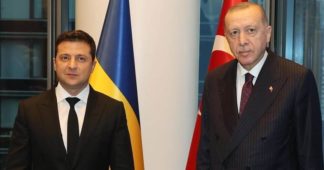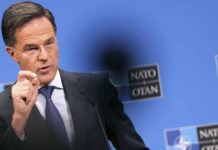By Yunus Soner
May 30, 2022
For Ursula von der Leyen, President of the European Commission, the mission is clear: “Ukraine must win this war. And Putin’s aggression must be a strategic failure”, she said in her speech on the World Economic Forum on May 27.
Von der Leyen declares to “stand with” Ukraine – and announces a whole package of aggressive imperialist measures against Russia and Ukraine. The well-known steps of sanctioning and arming the Ukraine target Moscow.
But the EU president also describes a package of measures which, by standing its side, turn the Ukraine into a colony:
“Ukraine needs budget support now to keep the economy running – it is about pensions; it is about salaries; it is about the basic services that have to be provided. And therefore, we have proposed a EUR 10 billion macro-financial assistance”, said von der Leyen.
Von der Leyen delivers a masterpiece of imperialist speech, where the announcement to “help Ukraine rise from ashes” is followed by her interpretation “why the Ukrainians have elected Volodymyr Zelenskyy in the first place”.
And “why the Ukrainians have elected Zelenskyy” are the list of measures that the EU President now demands – seemingly in the name of the Ukrainian electorate, as if that had elected her as supervisor – from the Ukrainian President: a combination of “massive investment with ambitious reforms: modernize Ukraine’s administrative capacity; establish rule of law and independence of judiciary; fight corruption; get rid of oligarchs; build a fair, sustainable and competitive economy”. Are the demands fulfilled, is a “Marshall Plan for Ukraine” on the way.
And of course emphasizes the EU President that all this is at the end for “our values and for humanity”.
By saying that this is “a defining moment for all democracies on the whole globe”, von der Leyen states she will qualify all countries’ political system as democracies – or not – based on their approach to Ukraine and Russia.
With this approach, von der Leyen represents what the influential magazine The Economist calls the “justice party”.
The British magazine does not refer to the EU’s strong intervention into Ukraine’s justice system, but to a group of actors “which thinks that Russia must be made paid dearly for its aggression”.
The opposite side is called by the Economist “the peace party”, the side rejecting the main target of delivering a strategic defeat to Russia and instead, looking for an urgent ceasefire.
The New York Times, not known to be friendly of Moscow, lit a spark with an editorial, stating “Biden should also make clear to … Zelensky and his people that there is a limit to how far the United States and NATO will go to confront Russia, and limits to the arms, money and political support they can muster”.
“Americans have been galvanized by Ukraine’s suffering, but popular support for a war far from U.S. shores will not continue indefinitely. Inflation is a much bigger issue for American voters than Ukraine, and the disruptions to global food and energy markets are likely to intensify”, the editorial added.
The German Foreign Minister Annalena Baerbock, who made herself a true name as warmonger, also played the same tune, warning – yes from her point of view an alarming situation against Kriegsmüdigkeit – war fatigue in western societies.
And then appeared Henry Kissinger at the very same World Economic Forum as von der Leyen, drawing a wider picture of the Ukraine conflict including Western – Russian relations and the factor of China, and ending with a diplomatic proposal that was interpreted that Ukraine should cede territory to Russia in order to achieve an agreement.
Kissinger thus provided more arguments in favor of a ceasefire and against turning Russia into long-term enemy of the West.
There are actually strong movements within the Western camp to limit the conflict politically on Ukraine, instead of considering it a confrontation on the world order; and prioritizing a cease of clashes.
Italian 4-point-plan presented to United Nations
The Italian Foreign Minister Luigi Di Maio has handed over a document with the plan to UN Secretary-General Antonio Guterres and the G7 countries on May 19.
Italy proposed four stages of ending the war:
- a ceasefire in Ukraine and the demilitarization of the front line under UN supervision;
- negotiations on the status of Ukraine, which provide for the country’s accession to the EU, and non-accession to NATO;
- bilateral agreement between Ukraine and Russia on Crimea and Donbas: at the suggestion of the Italian authorities, the “disputed territories” will have full autonomy with the right to ensure their own security, but sovereignty over the regions will belong to Kyiv;
- concluding a multilateral agreement on peace and security in Europe, covering disarmament and arms control, conflict prevention, and confidence-building measures.
The plan stipulates that Russian troops are then withdrawn from Ukraine.
Russian Foreign Minister Lavrov commented in an interview with Russia’s RT on the proposals with the words that “Serious politicians who want to achieve results and not promote themselves in front of their electorate, don’t propose things like that”.
But on May 27, two-time prime minister of Italy and former president of the European Union Romano Prodi, a convinced Atlanticist, expressed support for the plan. “The Ukraine crisis fallout will hit the EU badly. Sanctions will cost a lot to Italy and Germany and less to other EU countries,” Prodi said.
Italy carried this position also to the EU summit scheduled for May 30-31. At a meeting of EU envoys on 20 May, Italy’s ambassador proposed changes to the summit statement, saying it should refer to peace talks and set out an immediate ceasefire as one of the EU’s first goals, according to people who attended the meeting, reports EURACTIV. The current draft does not include any call to a ceasefire but reaffirms full support for Ukraine.
Italy’s proposal was backed by Hungary and Cyprus, which are among the states most critical of a new package of EU sanctions against Russia that has been blocked for weeks because of internal divisions.
Scholz and Macron speak to Putin – 80-minutes-long
German Chancellor Scholz and French President Macron called Russian President on May 28. There phone call lasted 80 minutes, as the German Federal Government declared in an official statement. According to Berlin, the two leaders have called for an “immediate ceasefire, withdrawal of Russian troops and a diplomatic solution” to the conflict.
In the meantime, there is growing criticism against the German government for not delivering military material to Ukraine fast enough.
That the Western public opinion slowly turns from the warmongering attitude of military victory at all cost to achieving a ceasefire and opening the path of negotiations, is reflected by harsh rejections of this tendency by representatives of the Ukrainian government.
Ukrainian President Zelenskyy criticized Kissinger directly, by writing in a an article “It seems that Mr. Kissinger’s calendar is not 2022, but 1938, and he thought he was talking to an audience, not in Davos, but in Munich of that time”.
Ukrainian Foreign Minister at Davos: NATO “as an institution has done literally nothing”
Ukrainian Foreign Minister Kuleba criticized NATO harshly when speaking at the World Economic Forum. “NATO did nothing since the beginning of the war. And my experts, my NATO experts, they say I have to be more constructive. But I am constructive. (…) We see NATO as an alliance, as an institution, sidelined and doing literally nothing. I’m sorry to say. I do not complain on allies”, Kuleba said.
Zelenskyy’s adviser Podolyak responded to the NYT via twitter, that concessions would “postpone a war for several years” – an interesting objection.
Today, any concession to Russia is not a path to peace, but a war postponed for several years. Ukraine trades neither its sovereignty, nor territories and Ukrainians living on them. It's a pity that we have to explain such simple things to such reputable media as @nytimes. pic.twitter.com/NJdLm7fWOV
— Михайло Подоляк (@Podolyak_M) May 21, 2022
The conflict over Ukraine again turns into one within the Western camp about relations with Russia and the place of the US in the world. Those that advocated the emergence of a multipolar world, which seemed to be in the defense, appear to regain cautiously some initiative.
We remind our readers that publication of articles on our site does not mean that we agree with what is written. Our policy is to publish anything which we consider of interest, so as to assist our readers in forming their opinions. Sometimes we even publish articles with which we totally disagree, since we believe it is important for our readers to be informed on as wide a spectrum of views as possible.
